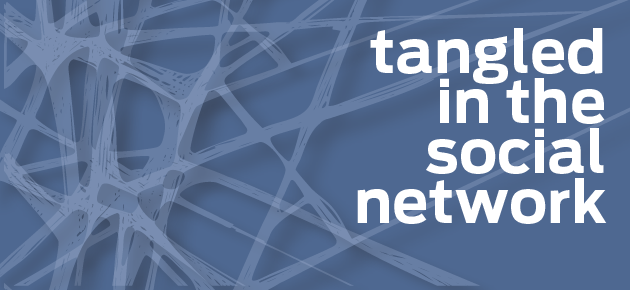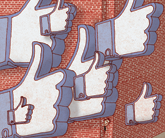Volume 33 Number 3 Spring/Summer 2011
In this Issue
Features
- Steen Begat
- Tangled in the Social Network
- Inked
- Phenomenal
- Death on the Tracks
The Editor's Page
- New media, renewed magazine
- Letters to the Editor
Along Middle Path
- Bugs and Backpacks
- A Taste of Hollywood
- Test your KQ
- Pass/Fail
- Writers Find Happy Medium on Radio
- The Hot Sheet
- Gambier is Talking About...
- Kenyon in Quotes
Books
- Miss Peregrine's Home for Peculiar Children
- Recent Books by Kenyon Authors
Office Hours
- Kong Size
- Burning Question: Why is it that the Middle Eastern uprisings took the world by surprise?
- Hunting for answers
Alumni News
- Give it another shot
- This is New York City
- In the 'homelessness tsunami'
- Memory man
- Obituaries
- Alumni Digest
- The indelible "K" on Wooster's field
The Last Page
- Social media through the ages

by Dan Laskin; Illustrations by Izhar Cohen
Related Stories
Kenyon on Facebook, Twitter, and more

In the new world of social media, Kenyon makes its presence known.
When in doubt, dither

When in doubt, dither: a middle-aged guy's guide to Facebook.
Worst cases

Tips on avoiding social networking disaster scenarios— both plausible and far-fetched.
Grassroots classmates
Kenyon's alumni from the '80s enjoy a new sense of community.
Social networking: a history
Get an inside look at the evolution of online social networking.
Unlike many of her Kenyon friends, Diana Carroll had little interest in Facebook when she graduated in 2004 and later headed off to the Yale Divinity School. But her fellow seminarians were flocking to Facebook, too. So, despite her reservations—"I thought that it was a senseless waste of time, and that if I joined, I would never get any work done again"—she opened an account of her own.
By 2008, when she got her first job, as an assistant rector of an Episcopal church, Facebook seemed indispensable. Carroll found herself running two church-related Facebook groups and set up a second profile for herself, exclusively for work-related matters. That's when things began to get complicated.
Yes, your priest is on Facebook these days, along with your kids, your parents, and the popular girls from high school whom you thought you'd managed to forget. Who isn't on Facebook, or Twitter, or MySpace, or LinkedIn? Last year, a Nielsen Company survey found that Americans spent nearly 23 percent of their online hours using social networks, more than any other activity, including e-mail. In 2010, according to the Washington Post, Facebook passed Google as the most popular site on the Internet. "Social networking trumped searching as America's favorite online pastime," said the story.
Most of us use Facebook mainly for chit-chat, trading family news, recipes, vacation photos. The mere contact provides a kind of social solace—something like grooming behavior among chimps. But we all have a public side, and many of us are discovering, as Diana Carroll did, that as social networking entwines itself into daily life, new issues and complications keep popping up.
Is it thoughtful or crass to offer condolences via Facebook? Are Facebook friends as "real" as face-to-face? When you apply for your next job, will your sophomore-year party photos resurface—the ones you thought you deleted?
We're discovering, too, a new field of opportunities—for if social networking is a pastime, it's also a powerful tool. Even if most of us don't habitually deploy Facebook or Twitter to help win elections (Democrats in 2008, Republicans in 2010), reshape public discourse (Tea Party activists), or topple dictatorships (protesters in the Middle East), we may well use such sites to join communities of kindred spirits or advance our favorite causes. Including Kenyon.
Walls come tumbling down
For Carroll, the initial allure of Facebook was the pleasure of seeing photos posted by friends. Indeed, it's just this, the personality-centered nature of social networking, that distinguishes it from other uses of the Web. At the heart of most social-networking sites is your profile and your network of friends. Also crucial is the fact that you can let it all hang out: depending on what privacy settings you choose, your pictures and posts and favorite links—and your list of friends, and potentially their stuff, too—is on public display.
Marketing expert David Meerman Scott '83, who has written extensively about using the Web for business (see Books), likes to compare the Web to a city. The corporate sites are the storefronts on Main Street; eBay is a garage sale. Social media, he has written, are "the bars, private clubs, and cocktail parties of the city," the "places people congregate to have fun."
The metaphor has to be stretched a bit for the congregation of the Church of the Holy Trinity, Rittenhouse Square in Philadelphia, where Carroll found her first job after seminary. She became administrator of the church's young-adult Facebook group and started another group for parishioners in general.
"People would sometimes contact me on Facebook to make a prayer request or raise pastoral issues," said Carroll—for example, to let her know if they were unwell. Carroll doesn't view Facebook as a substitute for personal meetings, but she feels it has a place, even in highly emotional and sensitive situations like mourning. But aren't condolences posted on someone's Facebook wall a kind of cop-out, less meaningful, somehow shallower? "It all depends," said Carroll. "I have certainly known people who have experienced great outpourings of support through Facebook."
Facebook life got messy for Carroll when her personal and professional communities began to overlap. In seminary, she had learned that, for a clergy person, boundaries are vital. She had set up her "church" Facebook identity because she didn't want parishioners clicking through her family photos or trying to chat with her if she happened to be online at 2:00 a.m.
But after a new colleague became a good personal friend, and she wondered which of her accounts to "friend" him on, and it turned out that they had mutual friends on both of her Facebook accounts, she realized that on Facebook, boundaries can easily dissolve.
So she "committed Facebook suicide" by pulling the plug on the work profile—a "messy business" that entailed messaging her work friends individually to explain what was going on, then sending them friend requests from her surviving personal profile. Meanwhile, she learned to use Facebook's privacy settings to create a "limited profile" category, so that work-related Facebook friends (including the bishop of Ohio ... yes, he's on Facebook, too) don't see private information like photos in which she has been tagged.
Brendan Keefe '90 also faced questions about the public-private divide. A television journalist with sixteen Emmys to his name, he found himself banned at first from the realm of social networking. By contract, TV stations control the way on-air journalists can present themselves in public, and when Facebook went from a campus-only phenomenon to an all-comers site in 2006, stations didn't like the idea of their reporters and anchors sharing too much.
By 2008, as social networking surged in popularity, TV stations began to use Facebook and Twitter for promotional purposes. "On a single day, we went from a complete ban on social networking to a mandate that we engage the viewer in new and innovative ways," said Keefe, a co-anchor and special-projects reporter for WCPO in Cincinnati.
No sooner did Keefe create a Facebook account than he was inundated with friend requests. "This was wonderful from a professional standpoint," he said, "but how was I going to share pictures of my young children with family friends if just about anyone could see them?"
Like Carroll, he created two Facebook profiles; unlike her, he has stuck with the two-identity solution. He admits that there is some "cross-pollination" between his work and personal profiles, but he deals with it by following a rule that anyone might take to heart: "I don't publish anything on Facebook I wouldn't want to see on a highway billboard."
Meanwhile, at a time when the Internet is becoming an increasingly important forum for public debate, the commingling of public and private on social networking sites puts journalists in a tough position. Their employers are urging them to "share," but the need for objectivity reins them in. Facebook, by nature so open, "presents a particularly restrictive and exclusive environment" for journalists, said Keefe. He and his colleagues may have thousands of Facebook friends, but they sometimes feel like "wallflowers sitting in the back of the virtual agora with tape over our mouths."
Embracing the collective
For the better part of a year, Facebook pretty much took over Will Bower's life. And he savored every minute of it, almost.
A 1994 Kenyon graduate, Bower was working as an intellectual-property researcher in Washington, D.C., when he got swept up in the 2008 presidential primaries. Via Facebook, he threw himself into two battles, one for Hillary Clinton as the Democratic nominee, the other against a primary system that he saw as grossly flawed.
His postings on primary reform prompted the Huffington Post, the major online news and opinion site, to make him a columnist. Meanwhile, one of the administrators of the "Hillary Clinton for President" Facebook group invited him to step in as a fellow administrator.
"At its peak, we had almost 40,000 members," said Bower. "During the most heated days of the primaries, I was posting links to as many as ten articles every thirty minutes or so."
It was heady, relentless, addictive. On two different occasions, he was posting so often that Facebook's alert system mistakenly flagged him as a spammer and took away his account, for about a week each time. "I felt severed from the collective in ways that still make me anxious when I think about it," Bower said.
Things only intensified after Barack Obama beat Clinton, and Bower, feeling that the system cheated the better candidate, created a protest Facebook group called PUMA, for Party Unity My A--. The media took notice, and life got even crazier. Between Facebook activities and media appearances, Bower found himself so busy that he had to quit his job. He also lost a few friends, people who couldn't abide his fierce political commitments.
But he did find love. Through the Clinton Facebook group, he got to know a Pennsylvania man and invited him to Washington for a political event. The two hit it off, his Facebook-friend-turned-partner moved to D.C., and the couple has been together ever since.
This year, one of Bower's New Year's resolutions was to spend no more than ninety minutes a day on Facebook. He actually times himself, keeping to twenty-minute sessions, four times a day. But he remains a true believer. He uses Facebook in his current work as an independent publicist. And he sees it as the "ultimate portal," connecting him to like-minded people.
"The Internet is almost infinite, and it's streaming 24/7," said Bower. "Your Facebook collective chooses things you're likely to be interested in; it makes the Internet more human."
Losing control
To be human, of course, is to err. And to err, on Facebook, is to overshare. What you post on Facebook can come back to bite you.
"The Internet records everything and forgets nothing," wrote legal scholar Jeffrey Rosen in the New York Times Magazine last year. And this fact "is threatening, at an almost existential level, our ability to control our identities; to preserve the option of reinventing ourselves and starting anew; to overcome our checkered pasts."
Disturbing stories abound, and Kenyon has not been immune. In 2006, some varsity athletes showed up on a Web site called badjocks.com, which had plucked photos from what appeared to be an alcohol-fueled hazing ceremony that had taken place more than a year earlier. The team in question had to forgo a season-opening trip, perform community service, and attend meetings about hazing. Kenyon's name still appears on a "dirty dozen" list devoted to team initiations, although the site has removed the pictures themselves. Will those photos turn up one day?
Many young adults are savvy about "reputation management," according to a May 2010 report by the Pew Internet & American Life Project. To erase their "digital footprints," they're adept at changing the privacy settings on their profiles, so as to limit what others can see online.
But can even the savviest of social networkers ever really control what the world can find out about them?
The problem with social networking is that it's social. "If your friend can see it, your friend can pass it on," said Rebecca Mazur, the Web programmer in Kenyon's Office of Public Affairs.
Information can "escape" from social networking sites in various ways, Mazur said. Facebook, for example, serves as a platform for thousands of applications—an "app" is essentially a way to use another Web site through Facebook—and the company allows those apps, by default, to see certain types of information, along with "just about everything else if the app writers can persuade you to give them permission." Moreover, depending on how much you share with friends, the apps that they use can provide an entry point into your information.
Mazur noted that "site scrapers" and "mirror sites" (which copy content from other Web sites) routinely dredge the Internet for information. So, even if you rush to remove something from Facebook that's potentially embarrassing, it may be too late.
"If something is posted publicly to the Internet, assume it's there forever," she said.
Her advice for anyone who uses the Internet, including social networking sites: Be aware of your online identity. Google yourself regularly. On the privacy settings in Facebook, disable "Public Search," so that people who enter your name in a search engine won't see a preview of your Facebook profile. And educate yourself—not through the news media, which oversimplify, but with "a trusted techie friend."
Mazur is a cautious Internet user herself. But her last bit of advice is: "Don't be afraid of social networking. People are people and have always been people."
That's where the fun comes in. And the problems, too.
To find Kenyon on Facebook: www.facebook.com/kenyoncollege
On Twitter: www.twitter.com/kenyoncollege
On YouTube: http://www.youtube.com/kenyoncollegevideo
Or click on the icons in the lower righthand corner of the Kenyon Web site (www.kenyon.edu).
Gambier, Ohio 43022
(740) 427-5158

 Delicious
Delicious Facebook
Facebook StumbleUpon
StumbleUpon Digg
Digg reddit
reddit